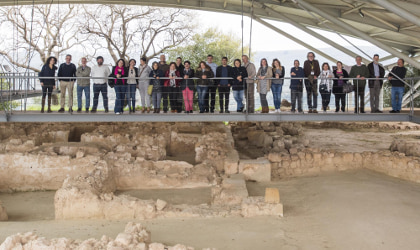The Athena International Olive Oil Competition was created by the first woman wine sommelier in Greece, who decided olive oil deserved as much attention as wine, and a former Paris urban planner who fell in love with wine in the City of Light. Maria Katsouli and Constantine Stergides are now “trying to bring [their] knowledge about wine to olive oil.”
They are doing this with “a paradigm based on terroir, varietals, growing techniques,” production techniques, a focus on producers, and attention to how different olive oils are consumed for different purposes, Stergides says. He believes “there’s been a huge renaissance in Greek wine,” and “what happened with Greek wine is going to happen with Greek olive oil.”
Stergides explains that he sees olive oil as “a bit like wine,” since different olive oils are appropriate for different purposes and foods. “We are all about taste. That is why we want to steer the competition toward a more wine-style competition,” not negating the way olive oil is typically tasted, but bringing in more elements from wine tasting, hoping in that way to help olive oil gain more value in consumers’ eyes.
A few years ago Maria Katsouli, the wine sommelier who had also become a certified olive oil tasting judge and instructor after studying in Italy and Spain, was wondering why Greece didn’t have its own international olive oil competition. She convinced her friend Constantine Stergides, a wine critic and managing director of Vinetum Wine Communications, to sponsor a new olive oil competition in Greece. With years of experience in wine competitions and judging, Stergides agreed, because he wanted to give Greece and Greek olive oil the prestige he believes they deserve in the olive oil world.
“It’s only just that Greece should be a player on the olive oil scene,” Stergides insists, since per capita Greek olive oil consumption is #1 in the world, Greece produces a larger amount of extra virgin olive oil as a percentage of its total olive oil production than any other country, Greece typically produces more olive oil than any country except Spain and Italy, Greek olive trees cover the third largest percentage of EU land in olive groves, and Greece is probably the country that started domesticating olive trees for olive oil production.
Stergides adds that Greece is “the country where when we say ‘oil’ we mean ‘olive oil,’ and our national cuisine is ‘ladera,’” which means “oily”—a word used for various vegetable stews and casseroles featuring an olive oil and tomato sauce. “Greece IS olive oil.” So “it’s a pity that most people have not heard of Greek olive oil, only Spanish and Italian. We want to play our part in changing this by organizing a competition that is as good as it gets.”
Stergides and Katsouli, now the Athena International Olive Oil Competition (IOOC) director, seek out the best judges, venues, and conditions possible, and they use some of the strictest rules in the business. They believe “bringing international judges to Greece is important because they are opinion makers in the olive oil industry.”
The Athena competition brings these olive oil judges to Greece, then provides them with a full experience of Greek gastronomy, culture, and olive oil. The competition takes place in a different region each year. It began in Athens, which legend says was named in honor of the goddess Athena after she produced a more valuable gift for its citizens than Poseidon: an olive tree, as opposed to Poseidon’s salt water spring or horse (depending on the version of the story).

In 2017, the competition took place in Messinia, one of Greece’s major olive and olive oil producing regions, with its famous Kalamata olives and the village that gave the popular Greek Koroneiki olive its name. Judges visited the Palace of Nestor, after touring the Acropolis the previous year. Next year, the competition will move to Delphi, legendary home of the oracle of Apollo and (according to the ancient Greeks) the center of the world. It is now the site of Greece’s largest uninterrupted olive grove.
The Athena IOOC awards ceremony takes place one month after the competition, following a presentation of the award winning olive oils for tasting. Greek food industry professionals from fine restaurants and specialty shops were among the guests that sampled 170 different extra virgin olive oils at this year’s event. Stergides explains that he considers this extra step important, because he wants people to have the opportunity to “taste and discover the olive oils” awarded at the Athena competition.
The Athena IOOC’s efforts attracted a sizable number of entries in their first year (260), including 60 foreign entries, followed by a 15% higher number of participants in their second year (295), with 140 from abroad—a 200% increase that emphasizes the international nature of the competition. Producers from Spain, Italy, and France as well as Greece attended the awards ceremony, touched by the honor because Greece is “the cradle of olive oil civilization,” according to Katsouli, with the important position in the olive oil world that this competition seeks to highlight.
______________
Update re 2018 competition: the registration deadline has been extended to March 12.



